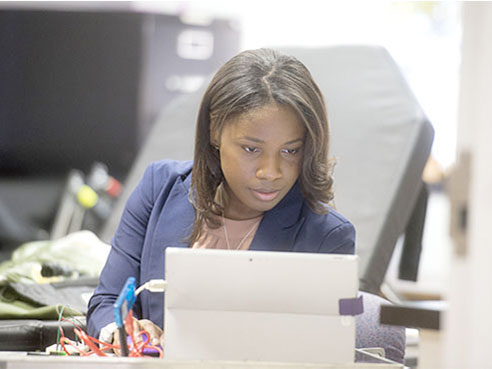 Johnson works on a device design at Birmingham's Innovation Depot.
Johnson works on a device design at Birmingham's Innovation Depot.
Ten years ago, Ophelia Johnson struggled to grasp the helicopter rescue line suspending her 30 feet above Hurricane Katrina’s murky floodwaters. When she finally let go, on dry land, her ordeal was not over. In the space of a week, she and her family had to sleep on an airport runway, escape a dangerous shelter for storm victims, and shuttle from her hometown of New Orleans to Texas and then Florida.
When a moment of calm finally arrived, Johnson knew instantly what she wanted to do next: “I was fueled by a passion to improve lives,” she says. It’s a path that has led her to UAB’s biomedical engineering program, where she has launched a career designing innovative medical devices. And soon it will take her to the United Kingdom as UAB’s newest Marshall Scholarship recipient.
A maximum of 40 young Americans receive the prestigious award, sponsored by the British government, each year. The scholarship finances their study in Great Britain toward a graduate degree in any field. Johnson intends to explore medical device design and entrepreneurship during a year at Imperial College London, focusing on the research that shapes design, and how design impacts manufacturing processes and overall costs. “Imperial also will help me gain a better understanding of the global market and regulatory environment for medical devices,” Johnson says. Immersion in London’s highly diverse cityscape will offer other lessons, including insights into the medical needs of different cultures. That “will help me learn to design devices for international implementation,” Johnson says.
Clever solutions
Originally, Johnson considered a career as a physician, but during a shadowing experience, she wasn’t concentrating on the surgery or the surgeon performing it. “I was more interested in the medical equipment that increased the efficiency of the procedure,” she says. She chose UAB and biomedical engineering—a joint department of the School of Engineering and School of Medicine—for their research opportunities for undergraduates. She couldn’t wait to get into the lab and start designing.
Since then, Johnson has developed a digital graphic interface that, when linked wirelessly to a glucometer implanted in the skin, will provide patients with diabetes with a simple, user-friendly way to track their blood-sugar levels. Another invention will take vital signs from emergency-department patients who are too ill to stand for traditional measurements. As a senior, she and a team of other biomedical engineering majors created a portable, enclosed “safe space” for people with autism. The enclosure, designed to be placed in shopping malls and other busy places, provides “a calming, relaxed environment to help individuals with autism feel secure,” Johnson says. The group worked with faculty in UAB’s Materials Processing and Applications Development Center to fabricate sound-dampening composite materials for the structure.
Johnson’s ingenuity has attracted attention both near and far. In addition to several UAB awards, Johnson was named the Engineering Council of Birmingham’s Outstanding Undergraduate Engineering Student. Nationally, she received a Goldwater Scholarship and was one of only 15 students selected for the prestigious UNCF/Merck Undergraduate Research Fellowship.
Designing devices excites Johnson because she relishes their potential both to improve patients’ health and to lower medical costs—which could, in turn, bring the benefits of care to more people. Currently, she is learning how to transfer those innovations from the design lab to the marketplace though UAB’s Master of Engineering in Design and Commercialization. In the multidisciplinary program, Johnson takes engineering courses along with M.B.A. courses as part of the Collat School of Business Graduate Certificate in Technology Commercialization and Entrepreneurship. She and other students are working on multiple projects—partnering with UAB Hospital to refine a device to accurately weigh critical patients in the emergency room, working with Children’s of Alabama to develop a tool to stop bleeding during neurosurgeries, and collaborating with the UAB Department of Physics on “a novel electrospinning device with applications in both tissue engineering research and the textile industry,” she says. The students also have joined forces with a local company to redesign a surgical drill kit for dental implants.
Connections for change
In London, Johnson plans to build strong networks with researchers, designers, business experts, and fellow students—connections that will come in handy as she works toward her career goals. “I would like to create devices that lower the cost of health care, and develop my own company with the mission of improving lives worldwide,” she says. “I plan to change the world, one step at a time.”
Along the way, Johnson plans to continue the Boaz Foundation, a program she began in high school to provide educational and development opportunities to underprivileged children. She is keenly aware that women and minorities are underrepresented in science, technology, engineering, and mathematics (STEM) fields—both in colleges and in the workforce—and she is happy to serve as a role model and mentor.
“I will be your first supporter and lead you to all the other supporters out there,” she tells middle- and high-school students considering a future in STEM. “Nothing can stop you if you don’t limit yourself. Continue to believe that all things are possible. This is the kind of thinking that leads to innovation. And don’t be afraid to ask questions—always ask questions, and you’ll continue to learn.”